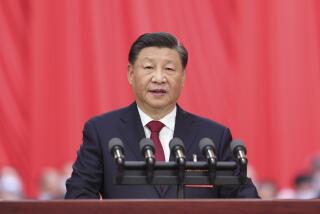‘Catastrophe’ of 1966-76 Chaos Blamed on Mao
- Share via
PEKING — An aging and confused Mao Tse-tung brought catastrophe to China by launching the 1966-76 Cultural Revolution, General Secretary Hu Yaobang said in a major speech marking the Communist Party’s 65th anniversary Tuesday.
The address was one of the party’s strongest attacks yet on China’s revolutionary leader, whose violent Cultural Revolution was meant to demolish all vestiges of Chinese feudal society. Thousands of people were killed and hundreds of thousands were persecuted during the decade of upheaval.
Hu delivered the speech, entitled “On Correctly Handling Two Different Types of Contradictions within the Communist Party,” on April 9. It was published Tuesday in commemoration of the July 1, 1921, founding of the Communist Party of China.
The front pages of major Chinese newspapers carried Hu’s speech, which said Mao’s mistaken emphasis on “antagonistic contradictions” within the party was directly responsible for the Cultural Revolution.
Confused Contradictions
“In his (Mao’s) later years, he badly confused the two types of contradictions, especially those differing in nature within the party, and put many things upside down,” Hu said.
“This led him to launch the Cultural Revolution, which brought catastrophe to the party and state and which could otherwise have been avoided.”
Hu also accused Mao of monopolizing decision-making and rejecting any dissenting opinions within the party leadership.
“Unfortunately, Comrade Mao Tse-tung was not good at dealing with contradictions in his later years,” Hu said.
“As a result, an atmosphere was created of rejecting different views, and correct opinions that differed somewhat from his were even regarded as right deviation, following the capitalist road or anti-party.”
During the Cultural Revolution, Deng Xiaoping, now China’s top leader, was labeled China’s “No. 2 Capitalist Roader” and publicly castigated, as were several other senior leaders who advocated more pragmatic economic policies.
Mao died Sept. 9, 1976. He was criticized for the first time by the party in 1982 for committing “serious mistakes.”
More to Read
Sign up for Essential California
The most important California stories and recommendations in your inbox every morning.
You may occasionally receive promotional content from the Los Angeles Times.













